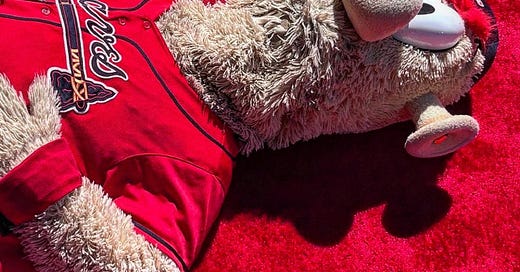Discussing Atlanta's Baseball-N-Business Model
Not sure where this all leads, but it's certainly something to keep an eye on...
Image via Blooper
The Atlanta Braves are at it again.
Never quite content with, well, anything, in a backstop swap for the ages, former Oakland catcher Sean Murphy will now pair with Travis d’Arnaud in Atlanta, and William Contreras will be taking his talents to Milwaukee.
There were other moving parts. Manny Piña heads to Oakland, as does left-hander Kyle Muller, also from Atlanta, and exciting INF/OF prospect Esteury Ruiz (via MIL), plus a host of prospects moving around the triumvirate (Ken Rosenthal of The Athletic provided what we currently know plus report credits).
And at the end of the day, that midnight train to Georgia just keeps rolling on. Look, we’re all familiar with the Braves’, um, business model. Everyone’s got their way.
Atlanta’s thing just happens to be locking in pre-arbitration players to long-term extensions (nothing confirmed yet for Murphy, but when in Rome, GA…), assuredly selling them on their vision plus a boatload of guaranteed cash.
What results is a roster full of young stars taking those guaranteed dollars now—their prerogative, of course—and, in turn, an exorbitant amount of money is left on the table down the line, presumably (and ownership is counting on it) once these players’ on-field values exceed their late-term contract values.
Whether or not Atlanta reinvests those potential savings back into the ball club is still very much to be determined. The Braves let a franchise cornerstone in Freddie Freeman leave for a not-Freeman-level player—monetarily or production-wise—in Matt Olson, so maybe the writing’s already on the wall in that regard.
Obligatory skepticism aside, you’d assume with a solid, young core and extra cash to spend, a contending team would allocate those funds toward championships. It takes money to make money, and churning out World Series appearances is likely as good as printing currency, so I guess we’ll see which way the wind blows.
And again, this is just one way of doing things (see Cohen, Steve). Is it “right”? As a wholly sympathetic party to the players and the MLBPA, it does feel a little unethical. But, in the same respect, these players are signing their names to these deals. That’s gotta mean something.
Without asking them those questions themselves (oh, hey Atlanta and national beat writers), we’ll have to simply assume they’re onboard with the plan—secure the bag now and potentially sacrifice a few bucks down the line.
In reality, Atlanta could very well be building an incredibly sustainable form of success by cementing its core in place before most, if any, of these youngsters will hit their respective primes.
Whether they become content with 90-win seasons and inflated profits or go the extra mile for their organization and its fans will be the crux.
OK, enough non-Mets stuff. More cooking throughout the week.
Never any paywalls. Once it hits the site, it’s yours. Of course, if you want to help keep the lights on, it’s greatly appreciated.
Become a paid subscriber below, or if you enjoyed the story, drop a buck or two in our Venmo account (@TheAppleNYM)



